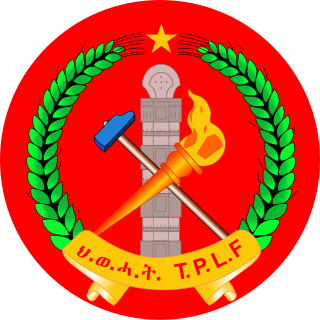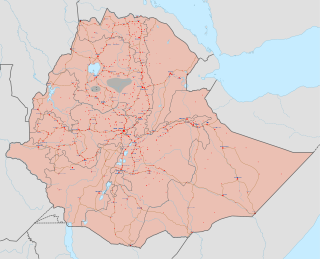
The politics of Ethiopia are the activities associated with the governance of Ethiopia. The government is structured as a federal parliamentary republic with both a President and Prime Minister. The government is multicameralism with a house of representative and a council. The term politics of Ethiopia mainly relates to the political activities in Ethiopia after the late 20th century when the democratization took place in the nation. The current political structure of Ethiopia was formed after the Tigrayan People's Liberation Front (TPLF) overthrew dictator President Mengistu Haile Mariam in 1991. General election was held in June 1994 and Ethiopia has maintained a multiparty political environment till today.

Ethiopia, officially the Federal Democratic Republic of Ethiopia, is a landlocked country in the Horn of Africa. It shares borders with Eritrea to the north, Djibouti to the northeast, Somalia to the east and northeast, Kenya to the south, South Sudan to the west, and Sudan to the northwest. Ethiopia has a total area of 1,100,000 square kilometres. As of 2022, it is home to around 113.5 million inhabitants, making it the 13th-most populous country in the world and the 2nd-most populous in Africa after Nigeria. The national capital and largest city, Addis Ababa, lies several kilometres west of the East African Rift that splits the country into the African and Somali tectonic plates.

Meles Zenawi Asres was an Ethiopian soldier and politician who served as President of Ethiopia from 1991 to 1995 and then Prime Minister of Ethiopia from 1995 until his death in 2012.

Ethiopia is a federation subdivided into ethno-linguistically based regional states and chartered cities. This system of administrative regions replaced the provinces of Ethiopia in 1992 under the Transitional Government of Ethiopia and was formalised in 1995 when the current Constitution of Ethiopia came into force.

The Tigray People's Liberation Front, also called the Tigrayan People's Liberation Front, is a left-wing ethnic nationalist paramilitary group, a banned political party, and the former ruling party of Ethiopia. It is designated as a terrorist organization by the Ethiopian government. It is widely known as Woyane, or Wayane in older texts and Amharic publications.

Under the current constitution, Ethiopia conducts local, regional, and federal elections. At the federal level, Ethiopia elects a legislature. The Federal Parliamentary Assembly has two chambers: the House of People's Representatives with not more than 550 members as per the constitution but actually nearly 547 members, elected for five-year terms in single-seat constituencies; and the Council of the Federation with 117 members, one each from the 22 minority nationalities, and one from each professional sector of its remaining nationalities, designated by the regional councils, which may elect them themselves or through popular elections.

The People's Democratic Republic of Ethiopia (PDRE) was a socialist state that existed in Ethiopia and present day Eritrea from 1987 to 1991.

General elections were held in Ethiopia on 15 May 2005, for seats in the House of Peoples' Representatives and four regional government councils. Under pressure from the international community, Prime Minister Meles Zenawi promised that this election would be proof that more democracy would come in this multi-ethnic nation; international elections observers from the European Union (EU) and the U.S.-based Carter Center were present to observe the results. This election succeeded in attracting about 90% of the registered voters to the polls. A government ban on protests was imposed throughout the election period.

According to the U.S. Department of State's human rights report for 2004 and similar sources, the Ethiopian government's human rights "remained poor; although there were improvements, serious problems remained". The report listed numerous cases where police and security forces are said to have harassed, illegally detained, tortured, and/or killed individuals, who were members of opposition groups or accused of being insurgents. Thousands of suspects remained in detention without charge, and lengthy pretrial detention continued to be a problem. Prison conditions were poor. The government often ignores citizens' privacy rights and laws regarding search warrants. Freedom House agrees; the site gave Ethiopia a six out of seven, which means that it is not free. Although fewer journalists have been arrested, detained, or punished in 2004 than in previous years, the government nevertheless continues to restrict freedom of the press. The government limits freedom of assembly, particularly for members of opposition groups, and security forces have used excessive force to break up demonstrations. Violence and discrimination against women continue to be problems. Female genital mutilation is widespread, although efforts to curb the practice have had some effect. The economic and sexual exploitation of children continues, as does human trafficking. Forced labor, particularly among children, is a persistent problem. Low-level government interference with labor unions continues. Although the government generally respected the free exercise of religion, local authorities at times interfere with religious practice. In order to improve Ethiopia's image, they hired US agencies to improve Ethiopia's image for $2.5 million. According to a report from Amnesty international 2016/2017 prolonged protests over political, economic, social and cultural grievances were met with excessive and lethal force by police. The report added that the crackdown on the political opposition saw mass arbitrary arrests, torture and other ill-treatment, unfair trials and violations of the rights to freedom of expression and association. On 9 October, the government announced a state of emergency, which led to further human rights violations. In September 2018, more than 20 have died in ethnic based attacks. Protestors outside the capital have been calling for the prime minister to issue a state of emergency to prevent further killings.
Hadiya is a zone in the Southern Nations, Nationalities, and Peoples' Region of Ethiopia. This zone is named after the Hadiya of the Hadiya Kingdom, whose homeland covers part of the administrative division. Hadiya is bordered on the south by Kembata Tembaro (KT), on the southwest by the Dawro Zone, on the west by the Omo River which separates it from Oromia Region and the Yem Special Woreda, on the north by Gurage, on the northeast by Silte, and on the east by the Alaba special woreda; the woredas of Mirab Badawacho and Misraq Badawacho form an exclave separated from the rest of the zone by KT. The administrative center of Hadiya is Hossana.

Damot Weyde is a woreda in Southern Nations, Nationalities, and Peoples' Region, Ethiopia. Part of the Wolayita Zone located in the Great Rift Valley, Damot Weyde is bordered on the south by Humbo, on the west by Sodo Zuria, on the northwest by Damot Gale, on the north by Diguna Fango, and on the north east by the Diguna Fango. The administrative center of the woreda is Bedessa. Diguna Fango woreda was separated from Damot Weyde.
Soro is one of the woredas in the Southern Nations, Nationalities, and Peoples' Region of Ethiopia. Part of the Hadiya Zone, Soro consists large population of Hadiya and Danta dubamo people, bordered on the south by the Kembata Tembaro Zone, on the southwest by the Dawro Zone, on the west by the Omo River which separates it from the Oromia Region, on the north by Gomibora, on the northeast by Limo, and on the southeast by Duna. The administrative center of this woreda is Gimbichu; other towns in Soro include Jajura. Parts of Soro were separated to create Duna and Gomibora woredas.
Offa is one of the woredas in the Southern Nations, Nationalities, and Peoples' Region of Ethiopia. Part of the Wolayita Zone, Offa is bordered on the south by the Gamo Gofa Zone, on the west by Kindo Didaye, on the north by Kindo Koysha, on the northeast by Sodo Zuria, and on the east by Humbo. The administrative center of Offa is Gesuba. Western part of Offa was added to Kindo Didaye woreda.
The 2005 Ethiopian general election violence, known generally as the Ethiopian police massacre, refers to the killing of civilians by government forces during June and November 2005 which led to the deaths of 193 protesters and injury of 763 others, mostly in the capital Addis Ababa, following the May 2005 elections in Ethiopia. More than 30,000 people were detained by security forces following the election, most released in 2006.

The Constitution of the Federal Democratic Republic of Ethiopia, also known as the 1995 Constitution of Ethiopia, is the supreme law of Ethiopia. The constitution came into force on 21 August 1995 after it was drawn up by the Constituent Assembly that was elected in June 1994. It was adopted by the Transitional Government of Ethiopia on 8 December 1994 and came into force following the general election held in May–June 1995.

General elections were held in Ethiopia on 23 May 2010.
General elections were held in Ethiopia on 24 May 2015 to elect officials to the House of Peoples' Representatives. Regional Assembly elections were also held on this date.
The 2021 Ethiopian general election to elect members of the House of Peoples' Representatives was held on 21 June 2021 and 30 September 2021. Regional elections were also held on those dates.

The Tigray War was an armed conflict that lasted from 3 November 2020 to 3 November 2022. The war was primarily fought in the Tigray Region of Ethiopia between the Ethiopian federal government and Eritrea on one side, and the Tigray People's Liberation Front (TPLF) on the other.
The Imperial Parliament of Ethiopia was the bicameral legislature of the Ethiopian Empire from 1931 to 1974. It consisted of the lower house, the Chamber of Deputies, and the upper house, Senate. The legislature was established in the 1931 Constitution, all members appointed, primarily by the Emperor of Ethiopia. The 1955 Constitution introduced elections to the lower chamber. The last elections took place in 1973. The legislature was abolished by Derg.









